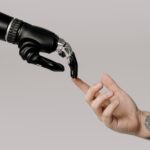What are the Top Business Tasks right for AI and Automation?
The rise of artificial intelligence (AI) is rapidly transforming the business landscape. As AI capabilities advance, more and more tasks that were previously done by humans are now being automated.
This brings immense opportunities to boost productivity, efficiency, and innovation across industries. However, it also raises concerns about human jobs being replaced by machines.
In this post, we’ll explore some of the top business functions that are ripe for AI automation based on their complexity, repetitiveness, and requirement for human judgment.
The goal is to provide business leaders and professionals insights into how they can best leverage AI to augment their workforces.
Customer Service & Support
One area where AI automation is already making huge inroads is customer service and support. Chatbots and virtual assistants are being deployed to handle routine customer inquiries, provide basic troubleshooting, and route issues to the right agents. This speeds up resolution times and allows human agents to focus on addressing more complex issues.
Over 80% of customers now prefer chatbots for simple queries like checking order status or logging a complaint. AI chatbots can understand natural language, access databases to find answers, and resolve common issues. Humans are still needed to handle emotional, intricate and sensitive issues. But automating repetitive tasks improves operational efficiency.
Customer service AI can go beyond chatbots too. For e-commerce businesses, AI can automatically process returns, initiate refunds, and suggest suitable replacements based on purchase history. For banks, AI can automate simple teller functions and even provide personalized investment advice based on a customer’s profile and goals. The possibilities are immense.
Data Processing & Analysis
Another area where AI excels is processing and analyzing large volumes of data faster than humans ever could. Tasks like data entry, data validation, cleaning data sets, and generating reports can be easily automated using intelligent algorithms.
For instance, an AI application can scan thousands of survey responses to rapidly identify patterns and insights. It can also spot anomalies or errors in the data that require human attention. Finance departments are deploying AI to automate invoice processing and reconciliation. AI is also being used to combat fraud by monitoring transactions for suspicious patterns.
When it comes to data analysis, machine learning algorithms can churn through data at unprecedented speeds to identify correlations and make predictions. AI assistants can generate regular reports and insights to support business decision-making. Such automation provides a scalable solution for gathering actionable intelligence from big data.
Content Creation
Creating high-quality content at scale is crucial for digital marketing and customer engagement. AI tools are now able to assist by producing relatively simple content such as blog posts, social media captions, newsletters, and more based on a few prompts.
For example, an AI content writer could generate a draft blog post by analyzing a few related articles to identify the right structure, tone, and keywords to use. This raw content can then be refined by human writers. While AI may lack creative flair, it can be useful for producing content that just needs straightforward information.
Natural language generation and voice synthesis AI can also automate audio-visual content creation. Basic explainer videos, talking avatars, and conversational bots can be generated from text scripts without extensive production. Such AI automation enables businesses to quickly produce a large volume of cheap, low-risk content.
Recruiting & HR
HR departments are turning to AI-driven solutions for various tasks involved in recruiting and managing people. AI resume screening tools can quickly parse through applicant resumes to identify suitable candidates for open positions based on job descriptions. This allows HR to focus on the top applicants.
For assessing candidates, video interview analysis AI can automatically score factors like facial expressions, tone, and speech patterns. While imperfect, this can supplement human recruiters by reducing unconscious bias. AI chatbots are also being used for screening candidates through conversational interviews.
Once hired, employees can get access to AI-powered chatbots to answer basic HR questions related to payroll, time off, insurance policies or trainings. These create efficiencies for HR while providing employees ready assistance. Overall, smart automation makes recruiting and HR more effective.
Accounting & Finance
Managing finances and accounts involves many repetitive and data-driven tasks that AI excels at. Automating the collection of invoices and matching them to payment records cuts down on the accounting workload. Smart algorithms can also be trained to audit documents and detect any inconsistencies or errors for investigation.
In finance, AI analytics tools are used to monitor market trends, generate trading signals, manage portfolios, and even execute trades through algorithmic or robo-advising. While human oversight is still needed, AI automation enables more rapid, data-driven financial decisions.
According to a PwC study, over 56% of finance tasks can be automated with the potential to cut costs by 40% or more. As AI capabilities grow, businesses can delegate more finance and accounting responsibilities to technology and focus human teams on value-added analysis.
Transportation & Logistics
Coordinating transportation and logistics involves juggling supply chains, inventory, warehouses, fleets, routes and delivery fulfilment. This is a complex undertaking with many moving parts. AI solutions are ideally suited to Parse these massive amounts of data and optimize logistics operations.
Route optimization algorithms can track traffic patterns and predict delivery times with pinpoint accuracy. Automated inventory management can reorder supplies and redistribute resources to meet demand fluctuations. AI also empowers autonomous vehicles and drones for self-driving deliveries.
According to McKinsey, AI could automate 50-80% of transportation management tasks and reduce operating costs by 10-40%. This makes logistics faster, cheaper and more responsive using smart automation.
Legal Services
In law firms, AI tools are assisting with aspects of legal work such as research, document review, due diligence and more. Case prediction algorithms can analyze case history and evidence to forecast outcomes and determine winning strategies. This provides attorneys valuable insights to strengthen cases.
For document intensive tasks like litigation discovery and contract review, AI can rapidly scan and extract relevant information at a fraction of the time of human reviewers. Natural language processing can also generate drafts of simple legal agreements which lawyers can finalize. Such automation allows firms to handle more cases faster.
That said, AI cannot fully replace human legal expertise. Complex legal arguments, high-stakes trials and client counseling require human skills. But there is tremendous potential to augment paralegals and lawyers by letting AI handle suitable repetitive tasks. This expands access to legal services.
IT & System Administration
Maintaining complex technology infrastructures and IT systems involves a range of repetitive management tasks. AI automation assists IT teams by handling common service desk requests, monitoring networks, resolving technical issues, optimizing system configurations and more.
For instance, AI chatbots act as virtual system admins by answering employee queries on passwords, access requests, app troublesshooting etc. Machine learning algorithms can continuously analyze traffic patterns and auto scale cloud resources to maintain optimal performance. AI assistants also automate cybersecurity threat detection and response.
According to Gartner, such automation could eliminate around 30% of system administration tasks that don’t require high-level human judgment. This enables IT teams to focus on high-value initiatives and adopting new technologies.
Sales & Marketing
Sales and marketing teams interact with customers daily to promote business offerings. Many of these repetitive tasks like sending follow-ups or promotional content are ideal for AI automation.
Intelligent chatbots act as conversational interfaces to engage website visitors and app users to drive sales. They can also automate lead generation and scheduling of demos. For email marketing, AI tools can generate customized promotions and tailor messaging at scale based on customer data and profiles.
In marketing, predictive analytics and sentiment analysis help uncover customer insights to optimize campaigns. AI assistants further help optimize bidding and ads targeting to stretch marketing budgets. Automation makes sales and marketing operations more efficient and insightful.
Should You Automate It?
This overview highlights some of the broad business domains where AI automation shows immense promise to augment human productivity. But how do you decide which specific tasks are ripe for automation versus those that require human judgment?
Here are a few key guiding principles:
- Repetitive and predictable: Structured tasks with clear rules that recur frequently tend to be the easiest to automate. Unpredictable work is harder.
- High volume: Automating work that has high transactional volume provides the most impactful efficiency gains.
- Doesn’t need specialized expertise: Straightforward tasks that don’t require human cognitive skills, intuition or subject matter expertise are prime for automation.
- Digital and data-driven: Work that involves digital information, data inputs and codifiable logic is simpler for AI versus sensory skills.
- Low risk: Automate low-risk repetitive tasks first while keeping high-risk and consequential work needing human oversight.
While AI automation can generate huge productivity gains, the smartest approach is to view AI as amplifying human capabilities rather than replacing jobs.
The best results come from combining the reliability of machines with human creativity, empathy and judgment. With the right strategy, AI can make businesses far more efficient, insightful and responsive.
Key Takeaways
- Customer service, data processing, content creation, recruiting, finance, logistics, legal services, IT administration, sales and marketing are some business domains where AI automation shows great promise.
- Intelligent algorithms can handle high volume repetitive tasks faster, cheaper and more reliably than humans.
- Automation enables human workers to focus their talents on higher value work requiring creativity, critical thinking, empathy, expertise and judgment.
- Tasks that are digital, data-driven, routine and low risk tend to be easier to automate, while unpredictable and high-risk work still needs human oversight.
- AI should augment human productivity rather than replace jobs for the best business value.
The rise of artificial intelligence brings both immense opportunities along with concerns about its business impact. With thoughtful adoption, companies can use AI automation to empower employees and better serve customers. The future lies in humans and machines working together symbiotically.
Hopefully this overview provides useful insights into where some of the biggest opportunities for AI in business exist today. But this is just the beginning, as AI capabilities will continue advancing and transforming more and more work over the next decade.







